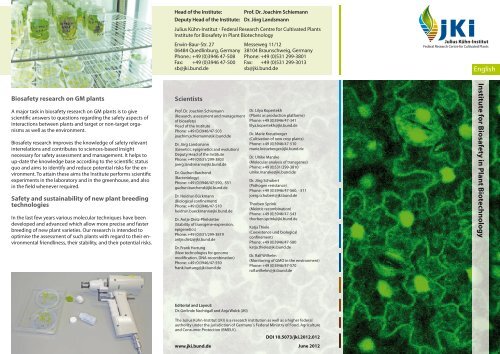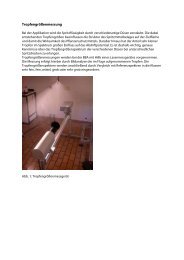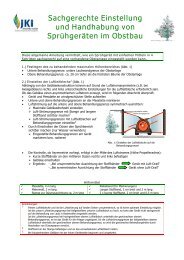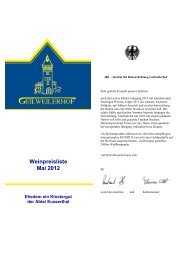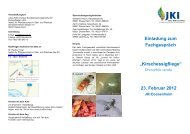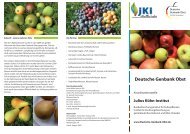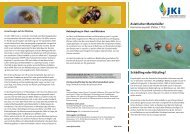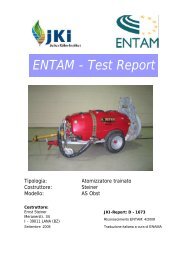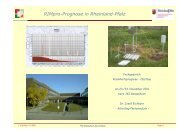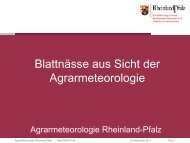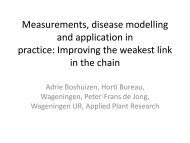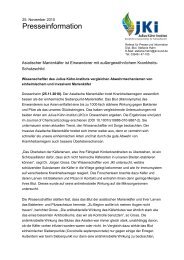Institutsflyer - Julius Kühn-Institut - Bund.de
Institutsflyer - Julius Kühn-Institut - Bund.de
Institutsflyer - Julius Kühn-Institut - Bund.de
Create successful ePaper yourself
Turn your PDF publications into a flip-book with our unique Google optimized e-Paper software.
Biosafety research on GM plants<br />
A major task in biosafety research on GM plants is to give<br />
scientifi c answers to questions regarding the safety aspects of<br />
interactions between plants and target or non-target organisms<br />
as well as the environment.<br />
Biosafety research improves the knowledge of safety relevant<br />
interrelations and contributes to sciences-based insight<br />
necessary for safety assessment and management. It helps to<br />
up-date the knowledge base according to the scientifi c status<br />
quo and aims to i<strong>de</strong>ntify and reduce potential risks for the environment.<br />
To attain these aims the <strong>Institut</strong>e performs scientifi c<br />
experiments in the laboratory and in the greenhouse, and also<br />
in the fi eld whenever required.<br />
Safety and sustainability of new plant breeding<br />
technologies<br />
In the last few years various molecular techniques have been<br />
<strong>de</strong>veloped and advanced which allow more precise and faster<br />
breeding of new plant varieties. Our research is inten<strong>de</strong>d to<br />
optimise the assessment of such plants with regard to their environmental<br />
friendliness, their stability, and their potential risks.<br />
Head of the <strong>Institut</strong>e: Prof. Dr. Joachim Schiemann<br />
Deputy Head of the <strong>Institut</strong>e: Dr. Jörg Landsmann<br />
<strong>Julius</strong> <strong>Kühn</strong>-<strong>Institut</strong> · Fe<strong>de</strong>ral Research Centre for Cultivated Plants<br />
<strong>Institut</strong>e for Biosafety in Plant Biotechnology<br />
Erwin-Baur-Str. 27 Messeweg 11/12<br />
06484 Quedlinburg, Germany 38104 Braunschweig, Germany<br />
Phone.: +49 (0)3946 47-508 Phone: +49 (0)531 299-3801<br />
Fax: +49 (0)3946 47-500 Fax: +49 (0)531 299-3013<br />
sb@jki.bund.<strong>de</strong> sb@jki.bund.<strong>de</strong><br />
Scientists<br />
Prof. Dr. Joachim Schiemann<br />
(Research, assessment and management<br />
of biosafety)<br />
Head of the <strong>Institut</strong>e<br />
Phone: +49 (0)3946/47-503<br />
joachim.schiemann@jki.bund.<strong>de</strong><br />
Dr. Jörg Landsmann<br />
(Genetics, epigenetics and evolution)<br />
Deputy Head of the <strong>Institut</strong>e<br />
Phone: +49 (0)531/299-3803<br />
joerg.landsmann@jki.bund.<strong>de</strong><br />
Dr. Gudrun Barchend<br />
(Bacteriology)<br />
Phone: +49 (0)3946/47-590, -551<br />
gudrun.barchend@jki.bund.<strong>de</strong><br />
Dr. Heidrun Bückmann<br />
(Biological confi nement)<br />
Phone: +49 (0)3946/47-510<br />
heidrun.bueckmann@jki.bund.<strong>de</strong><br />
Dr. Antje Dietz-Pfeilstetter<br />
(Stability of transgene-expression,<br />
epigenetics)<br />
Phone: +49 (0)531/299-3819<br />
antje.dietz@jki.bund.<strong>de</strong><br />
Dr. Frank Hartung<br />
(New technologies for genome<br />
modifi cation, DNA-recombination)<br />
Phone: +49 (0)3946/47-550<br />
frank.hartung@jki.bund.<strong>de</strong><br />
Editorial and Layout:<br />
Dr. Gerlin<strong>de</strong> Nachtigall and Anja Wolck (JKI)<br />
The <strong>Julius</strong> <strong>Kühn</strong>-<strong>Institut</strong> (JKI) is a research institution as well as a higher fe<strong>de</strong>ral<br />
authority un<strong>de</strong>r the jurisdiction of Germany´s Fe<strong>de</strong>ral Ministry of Food, Agriculture<br />
and Consumer Protection (BMELV).<br />
DOI 10.5073/jki.2012.012<br />
www.jki.bund.<strong>de</strong><br />
Dr. Lilya Kopertekh<br />
(Plants as production platforms)<br />
Phone: +49 (0)3946/47-341<br />
lilya.kopertekh@jki.bund.<strong>de</strong><br />
Dr. Marie Kreuzberger<br />
(Cultivation of new crop plants)<br />
Phone: +49 (0)3946/47-510<br />
marie.kreuzberger@jki.bund.<strong>de</strong><br />
Dr. Ulrike Manske<br />
(Molecular analysis of transgenes)<br />
Phone: +49 (0)531/299-3810<br />
ulrike.manske@jki.bund.<strong>de</strong><br />
Dr. Jörg Schubert<br />
(Pathogen resistance)<br />
Phone: +49 (0)3946/47-560, - 511<br />
joerg.schubert@jki.bund.<strong>de</strong><br />
Thorben Sprink<br />
(Meiotic recombination)<br />
Phone: +49 (0)3946/47-543<br />
thorben.sprink@jki.bund.<strong>de</strong><br />
Katja Thiele<br />
(Coexistence und biological<br />
confi nement)<br />
Phone: +49 (0)3946/47-580<br />
katja.thiele@jki.bund.<strong>de</strong><br />
Dr. Ralf Wilhelm<br />
(Monitoring of GMO in the environment)<br />
Phone: +49 (0)3946/47-570<br />
ralf.wilhelm@jki.bund.<strong>de</strong><br />
June 2012<br />
English<br />
<strong>Institut</strong>e for Biosafety in Plant Biotechnology
<strong>Institut</strong>e for Biosafety in Plant Biotechnology<br />
The activities of the <strong>Institut</strong>e focus on the assessment of, and<br />
research on new biotechnological methods applied to plants,<br />
including gene technology. These activities are <strong>de</strong>rived from the<br />
German Gene Technology Act, the Plant Protection Act, other<br />
legal regualtions, and from the research schedule issued by the<br />
Fe<strong>de</strong>ral Ministry of Food, Agriculture and Consumer Protection<br />
(BMELV). They especially concentrate on risk assessment and<br />
monitoring of genetically modifi ed organisms (GMO) and on<br />
coexistence of cultivation systems with and without GM plants.<br />
Activities and research areas<br />
Scientifi c opinions on applications for fi eld<br />
release and placing on the market of GMO<br />
According to the German Gene Technology Act the release of<br />
GMO and the placing on the market of products containing, or<br />
consisting of GMO are subject to approval.<br />
Within these approval procedures, the <strong>Institut</strong>e prepares the<br />
scientifi c opinions of the JKI. These are integrated into the <strong>de</strong>cisions<br />
taken by the competent fe<strong>de</strong>ral authority (Fe<strong>de</strong>ral Offi ce of<br />
Consumer Protection and Food Safety, BVL) in agreement with<br />
additional fe<strong>de</strong>ral agencies. Prior to approving a fi eld release the<br />
fe<strong>de</strong>ral state agency in charge gives its opinion, and the public<br />
must be involved.<br />
In the same way the JKI is involved in the scientifi c assessment<br />
procedure for the placing on the market of food and feed for<br />
which the European Food Safety Authority (EFSA) is in charge.<br />
Assessing the risks of new traits of GM plants<br />
Gene technological methods allow for the transfer of genes, as<br />
isolated nucleic acid (DNA) segments, in vitro among various<br />
organisms in an asexual manner. This means that animals, plants,<br />
microorganisms and viruses can be equipped with characteristics<br />
that did not evolve un<strong>de</strong>r these biological and ecological conditions.<br />
The expert assessment of these characteristics is based<br />
on scientifi c principles and criteria laid down in an assessment<br />
scheme. The scientifi c expertise of the <strong>Institut</strong>e, resulting from its<br />
own research activities as well as from national and international<br />
research results, gives assistance in preparing the opinions on<br />
fi eld releases and placing on the market of GM plants.<br />
Monitoring the environmental eff ects of GM<br />
plants in the agro-ecosystem during cultivation<br />
The EU Directive 2001/18/EC <strong>de</strong>mands that during the cultivation<br />
of GM plants their possible eff ects on the environment and<br />
on human beings are monitored. This requirement was converted<br />
into German law by the Gene Technology Act.<br />
The monitoring system is inten<strong>de</strong>d as an early warning system to<br />
<strong>de</strong>tect unexpected eff ects resulting from the cultivation of GM<br />
plants. It shall clarify uncertainties in the risk assessment which<br />
may not have been <strong>de</strong>fi nitely appraised by experiments limited<br />
in time and space. Possible negative eff ects which may occur<br />
either directly or indirectly, e. g. by interactions of the GM<br />
plants with benefi cial insects and pests on the cultivated area<br />
or on neighbouring fi elds and biotopes, have to be recor<strong>de</strong>d.<br />
These general objectives have to be integrated into a monitoring<br />
concept specifi c for a certain crop plant with one or several<br />
transgenes. In addition to the <strong>de</strong>velopment of new investigation<br />
methods, established control systems can be inclu<strong>de</strong>d in a<br />
GMO monitoring scheme. The aim is to establish effi cient and<br />
practicable structures for a routine monitoring as elements of<br />
the risk management of GM plants.<br />
Coexistence of agricultural production systems<br />
The term ‘coexistence’ <strong>de</strong>fi nes the si<strong>de</strong>-by-si<strong>de</strong> use of conventional<br />
or organic agricultural methods and agriculture applying<br />
genetically modifi ed plants.<br />
Strategies are <strong>de</strong>signed and evaluated, allowing a compatible<br />
si<strong>de</strong>-by-si<strong>de</strong> application of agricultural production systems<br />
with and without gene technological methods. Thanks to the<br />
expertise gathered in many research projects and documented<br />
in various publications, members of the JKI take an active part<br />
in national, international and European committees engaged<br />
in the problems linked to coexistence on the scientifi c and<br />
regulatory level.


